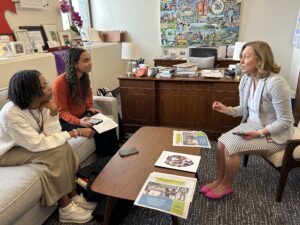
Mental health among teenagers has spiraled as an issue in recent years. In the current crisis, advocates, legislators and youth are advocating for reform this legislative session as a means for change. Those bills in the 2024 session are dedicated to addressing the barriers youth face and take steps to address the mental health crisis among youth.
To learn more about the issue, ThreeSixty interviewed Rep. Heather Edelson (DFL, Edina). As a former therapist, Edelson has actively taken steps for mental health reform through her legislative work. This session, she is sponsoring bills HF3745 and HF1706, both dedicated to addressing youth mental health as a means for reform.
ThreeSixty also interviewed AspireMN, a nonprofit leading advocacy efforts.
This interview has been edited for length and clarity.
What drives your motivation for mental health reform as a legislator?
I grew up very differently. I was raised by a single mom, and we had a lot of financial stressors. When I think about mental health policy, I think of truly what it is to be a human being and to operate in the world.
Everybody struggles with mental health. It just can be to varying degrees. As somebody who likes psychology, I always think of what our cognitive abilities do to go through it. Not everybody have resiliency, nor should they, but what does it look like to help people? If you think about mental health at the forefront, you’re going to be improving public policy.
What are these bills bringing to the table that other incentives don’t?
What it’s trying to address is a gap in schools and a gap with how students are using therapy. Then for this other one, what it’s aiming to solve is that people have constitutional rights, and we in the state of Minnesota need to evaluate their constitutional rights just because a person is mentally ill and struggles with mental illness or addiction or whatever it is, and they’ve committed a crime. Does that mean they’re sentenced to a life where they sit in jail for six months with no access to services? That is not what it means. Both bills are trying to address injustice or a gap that we are seeing.
How do you think young people can make their voices heard on this issue?
They can come to testify. They can write letters, they can come and spend the day with me, and I have an open-door policy. You can come to spend the day at the Capitol with me and shadow me for a day.
How will these mental health bills be incorporated into future students’ lives?
We need to have access to digital therapy or services. Do they want to go in a room and just text (their counselor) and be like, “This is what I’m feeling right now.” Minnesota passed telehealth legislation that would allow a therapist from another state or another part of the northern part of the state or another state, in general, to have access to that student to give them what they need at the time. Is that something we should do? That’s a conversation I want to have.
What advice do you have for youth who are struggling?
We all have bad days, even when you have a bad day, you get up and do it the next day. And if somebody tells you, “No,” they don’t know you. Always define yourself by yourself.
Nieyomi worked with Sahan Journal reporter Alfonzo Galvan to finish her story. This story was completed at ThreeSixty’s Winter News Team: Capitol Edition in February 2024, where high school journalists covered important legislative issues, impacting Minnesota youth. Read more stories here.
